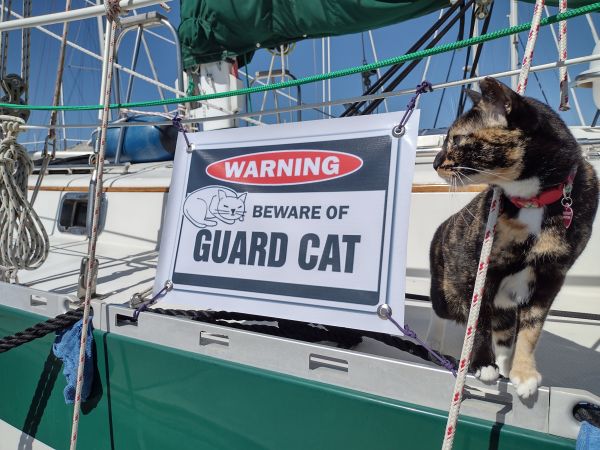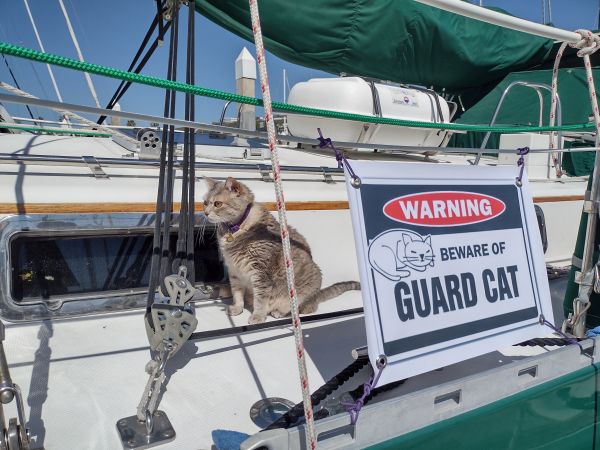

Spring weather is an ideal time to sail from the US/Mexico Pacific Coast to the South Pacific. After a three-year delay due to the COVID pandemic, we are finally preparing to set sail for the South Pacific. Hopefully, it won’t be much longer.
We have two cats on board, Swat and Happy. John decided to keep Swat, who was born in 2013 in Puerto Rico, and Happy, who was born in 2020 in Panama. He loves cats more than anything. As for me, I think sailing around the world with pets is a bit nonsensical, even though they are precious. Sorry Swat and Happy!
Sailing with pets requires extra documents to enter some islands and countries, such as Tahiti (French Polynesia), Fiji, New Zealand, Australia, Hawaii, Japan, and England. Both Swat and Happy have all the necessary vaccines and a microchip implanted in their bodies. We have been working on meeting the requirements to bring Swat and Happy to French Polynesia.
At the moment, we are waiting for the results of the “Rabies Titration Test,” which takes about a month to receive. To find a testing clinic, I called or visited five US and five Mexican veterinary clinics. Only one clinic in San Diego (costing 321 USD/cat) and one in Ensenada, Mexico (costing 13,000 Mexican Pesos, or about 700 USD/cat) said they could perform the test. I had to explain to the receptionists in each clinic what the “Titration Test” is. It’s more expensive in Mexico because the clinic sends the cats’ blood/serum samples to the USA, most likely to the University of Kansas.
We decided to do the test in Mexico because (1) US clinics may require prior exams, which can be costly, (2) it’s difficult to find a live-aboard marina space in San Diego, and (3) it’s more expensive to stay in the marina in San Diego than in Ensenada, Mexico.
John has been communicating with an official in the Biosecurity Department in Tahiti, French Polynesia. Once we get the Titration Test results, we’ll send all the required documents to the official. Our plan is to set sail for the South Pacific only after we receive the “Approval Sign” from French Polynesia. This way, we won’t risk losing the cats or being denied permission to sail in the South Pacific region.
<Information on French Polynesia Requirements for the Permission to Bring the Cats on Private Vessels, as of March 2023 – Source: Form N211A, Biosecurity, French Polynesia>
- An official document establishing your day of departure from the last country infected with rabies you visited
- An official document establishing your date of entry in French Polynesia
- Official document establishing your animal has been implanted with an ISO 11784 microchip or has an official tattoo
- Veterinary certificate of internal and external antiparasitic treatment carried out either before departure from the last country visited, or within the month preceding the day of disembarkation of the animal
- Veterinary certificate of internal and external antiparasitic treatment carried out either by the veterinarian before disembarking the animal, at least 14 days after the 1st treatment of the animal
- Copy of the identification card of the animal
- Copy of the vaccination record book or European passport
- For Dog: Negative result of the leishmaniasis test
- For Dog Breed: Certificate of registration in a studbook recognized by the international Cynological Federation (FCI) for a dog from the following list: Rottweiler, Staffordshire Bull Terrier known as Staffle, American Staffordshire Terrier, Argentine Mastiff, Fila Brasileiro, Broholmer, German Mastiff, Mallorcan Mastiff, Mastiff Bordeaux, English Bulldog, Bullmastiff, Mastiff, Neapolitan Morning, Italian Cane Corso, Tosa. “Boul’Am”, “Bully” are not recognized by the FCI, and are forbidden to enter in French Polynesia.
***Additional Requirements if the animals does not come directly from one of these countries: Australia, Bahrain, Barbados, Falkland Islands, Fiji, Guam, State of Hawaii, Iceland, Japan, Norfolk Island, New Caledonia, New Zealand, Singapore, Vanuatu, Wallis/Futuna
- The animal is older than 9 months and 21 days
- The animals have been vaccinated against rabies for more than 6 months and 21 days in the event of primary vaccination. In the event of a recall, the injection must have been carried out within the time limits recommended by the manufacturer. Vaccination is carried out on animals at least 3 months old
- Rabies Titration: 0.5UI/ml / Titration of more than 3 months and less than a year before the disembarkation date.